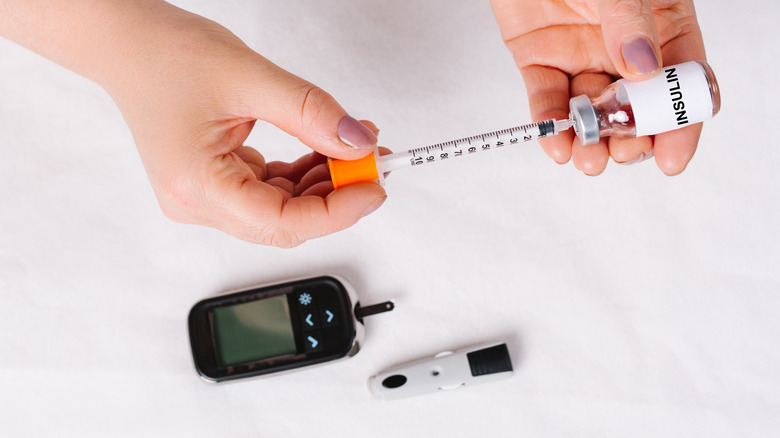Can You Be Insulin Resistant Without Being Diabetic?
About 10% people in the United States have diabetes, and about 20% of people with diabetes are unaware that they have it, according to the Centers for Disease Control and Prevention (CDC). Among American adults, more than a third have prediabetes, which means their bodies either don't make enough insulin or don't use insulin efficiently to stabilize blood sugar.
As the Cleveland Clinic explains, your pancreas secretes insulin to help regulate glucose levels in your blood. The insulin helps usher glucose into parts of your system that need it for energy. Insulin resistance occurs when the body's cells do not respond appropriately to the hormone insulin, meaning glucose can no longer be moved from the blood into cells for energy. When this happens, the body tries to compensate by producing more and more insulin.
However, it's possible to have insulin resistance without being diabetic. Your insulin resistance can be temporary or chronic. For instance, taking a course of steroid medication can make you temporarily insulin resistant, whereas being overweight, inactive, and eating an unhealthy diet are all factors that might lead to chronic insulin resistance. If your insulin resistance becomes chronic, your blood sugar levels could be high enough to make you prediabetic.
Insulin resistance can lead to diabetes
Your blood glucose can remain healthy if your body can both produce and use insulin well enough to move the glucose. If not, blood sugar levels can become higher than normal, but still below levels for a diabetes diagnosis. According to the CDC, prediabetes still can put you at risk for heart disease and stroke. If you don't manage your prediabetes with treatment, you could develop type 2 diabetes in five years.
According to the National Institutes of Health, you're more at risk for insulin resistance, prediabetes, and type 2 diabetes if you're overweight, over 45 years old, or physically inactive. Having a family member with diabetes also increases your risk. Health conditions such as high blood pressure, high cholesterol, or cardiovascular disease can put you at elevated risk as well. Certain medications can also contribute to insulin resistance, including glucocorticoids, antipsychotics, or HIV medications. Hormonal disorders and sleep problems also increase your risk for insulin resistance.
Health professionals recommend regular exercise and a healthy diet as lifestyle measures to reduce your chances of being insulin resistant. Keeping an eye on your weight will also help lower your chances of developing any complications associated with insulin resistance.


